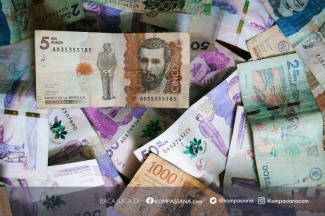The war against COVID-19 pandemic in the economic battlefield continues. The pandemic currently sweeping the world has caused many developed countries like the US, UK, Germany, France, Japan to Singapore fell into a hole of economic recession.
The economic foundations of these developed countries, unfortunately, are unable to withstand the economic recession caused by COVID-19 attacks. However, some countries have survived the recession by showing economic growth, albeit a small growth, such as China and Vietnam. Then what about Indonesia? Can Indonesia escape from the economic recession following in the footsteps of the two countries?
The finance minister of the Indonesia government, Sri Mulyani, said that at this time Indonesia could not be said to have fallen into the economic recession, because the economic contraction was recorded only once. It occurred in the second quarter of 2020 (year-to-year). Meanwhile, the economic contraction on a quarter-to-quarter basis, it is not appropriate to use it as a benchmark for economic recession since the Indonesian economy is still heavily influenced by seasonal factors.
Maximize Government Spending (APBN)
Even though Indonesia has not yet fallen into the economic recession. But in the second quarter of 2020, the economy has contracted. Then how can Indonesia avoid the economic recession?
Technically by ensuring that GDP growth in the third quarter is non-negative or in other words the value of GDP at constant prices in the third quarter is at least the same as GDP at constant prices in the third quarter of 2019, namely IDR 2,818.88 Trillion. Meanwhile, it should be noted that Indonesia's GDP in the second quarter of 2020 was IDR 2,589.64 Trillion. So there is still a big gap if the Indonesian economy runs like the previous quarter.
In this unstable economic condition where many private companies have experienced the impact of COVID19, the role of the government to drive the economy is increasingly important. One of them is by maximizing government spending, both the state budget and regional budgets. If we look at the accumulative of government spending, it can be seen that there is still budget space that should be absorbed to maximized government spending.
By the second quarter of 2020, the total of government spending was only 1,068.93 trillion, namely IDR 452.39 trillion in the first quarter and IDR 616.54 trillion in the second quarter of 2020. This value is equivalent to 39% of the total 2020 budget by IDR 2.737,17 Trillion. Therefore, in the third quarter of 2020, the government can maximize government spending up to Rp. 2,737.17 Trillion (equivalent to 75% of the total budget), especially government spending which has a trickle-down effect on the economy and increases the purchasing power of the lower-middle-class people.
Domestic Market and Main Sectors of GDP
Like China, Indonesia benefits because it has a large domestic market. Supposedly, even though international trade has hampered because the majority of Indonesia's trading partners countries are experiencing an economic recession, Indonesia still has a chance to have positive growth in the third quarter of 2020. Therefore, Indonesia must rely on the domestic sector to escape the threat of the economic recession.
To boost GDP in the third quarter of 2020, in addition to maximizing government spending, the government can also provide some stimulating policies in the main sectors of GDP e.g the Manufacture, Agriculture, and Wholes and Retail Sectors.
